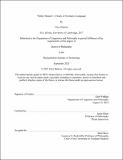Within ‘Reason’: A Study of Normative Language
Author(s)
Watkins, Eliot
DownloadThesis PDF (686.2Kb)
Advisor
Khoo, Justin
Terms of use
Metadata
Show full item recordAbstract
What do we mean when we say that someone ought to do something? What do we mean when we say that someone has a reason to do something? What do we mean when we say that someone has more reason to do one thing rather than another? The primary goal of this project is to shed light on these semantic questions.
The picture of normative talk that I develop across this thesis has a distinctive feature: the notion of a reason (roughly, a fact that counts in favour of something) isn’t given any fundamental role to play. Instead, the meanings of ‘ought’, ‘must’ and ‘is a reason for…’ are all understood in terms of something gradable – they’re understood in terms of facts about how much reason there is for something to be done.
Chapter One focuses on deontic modals like ‘ought’ and ‘must’. I argue that the standard semantics for these expressions is incompatible with the idea that facts about what you ought to do are connected with facts about what you have reason to do. I develop a new semantics for deontic modals which builds-in the connections between ought and reasons from the ground up.
Chapter Two centres on ‘reason’. We use ‘reason’ as both a count noun (as in “there is a reason for you to read my dissertation”) and a mass noun (as in “there is some reason for you to read my dissertation”). I argue that the best semantics for ‘reason’ will treat the mass form as fundamental. ‘Reason’ is a predicate of a particular kind of state – the state someone is in when they have reason to do something. I turn this result into an argument against the enduringly popular idea that count noun reasons are normatively fundamental.
Chapter Three stays with reasons. According to a standard picture, normative reasons do not extend beyond the boundaries of agency. If something isn’t an agent – if it can’t do rudimentary practical reasoning – then there can’t be normative reasons for it to do one thing rather than another. I argue that this standard picture gets things totally wrong: there are reasons for non-agents to be certain ways and do certain things. We must not analyse what it is to be a reason by appealing to distinctively agential capacities.
Date issued
2023-09Department
Massachusetts Institute of Technology. Department of Linguistics and PhilosophyPublisher
Massachusetts Institute of Technology